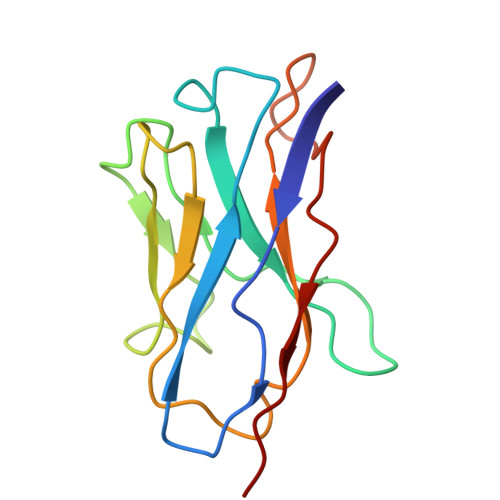Antibody affinity versus dengue morphology influences neutralization.
Fibriansah, G., Lim, E.X.Y., Marzinek, J.K., Ng, T.S., Tan, J.L., Huber, R.G., Lim, X.N., Chew, V.S.Y., Kostyuchenko, V.A., Shi, J., Anand, G.S., Bond, P.J., Crowe Jr., J.E., Lok, S.M.(2021) PLoS Pathog 17: e1009331-e1009331
- PubMed: 33621239
- DOI: https://doi.org/10.1371/journal.ppat.1009331
- Primary Citation of Related Structures:
7DWT, 7DWU - PubMed Abstract:
Different strains within a dengue serotype (DENV1-4) can have smooth, or "bumpy" surface morphologies with different antigenic characteristics at average body temperature (37°C). We determined the neutralizing properties of a serotype cross-reactive human monoclonal antibody (HMAb) 1C19 for strains with differing morphologies within the DENV1 and DENV2 serotypes. We mapped the 1C19 epitope to E protein domain II by hydrogen deuterium exchange mass spectrometry, cryoEM and molecular dynamics simulations, revealing that this epitope is likely partially hidden on the virus surface. We showed the antibody has high affinity for binding to recombinant DENV1 E proteins compared to those of DENV2, consistent with its strong neutralizing activities for all DENV1 strains tested regardless of their morphologies. This finding suggests that the antibody could out-compete E-to-E interaction for binding to its epitope. In contrast, for DENV2, HMAb 1C19 can only neutralize when the epitope becomes exposed on the bumpy-surfaced particle. Although HMAb 1C19 is not a suitable therapeutic candidate, this study with HMAb 1C19 shows the importance of choosing a high-affinity antibody that could neutralize diverse dengue virus morphologies for therapeutic purposes.
- Emerging Infectious Diseases, Duke-National University of Singapore Medical School, Singapore, Singapore.
Organizational Affiliation:


















